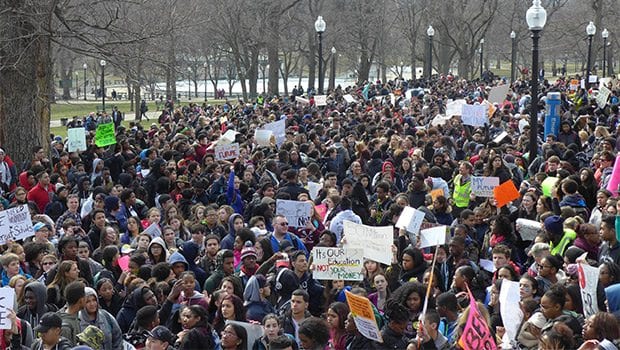Thousands of BPS students rally against cuts as Education Committee meets on charters

Thousands of Boston Public School students walked out of school on Monday and marched on the State House to protest the expected budget shortfall that would cause cuts to classes, teachers and programs. Students from schools throughout BPS came together, chanting slogans such as “Student power!” and “No education? No way!”
Estimates put BPS’s budget shortfall at $38-50 million.
“Because we don’t have the right to vote, this [protest] is our way,” Isabelle Doerre, a sophomore at Boston Latin School, told the Banner. She said some of the favorite teachers at BLS are in their first year, making them likely to be cut.
Luisa DaSilva, a grade 10 student at Community Academy of Science and Health, said the school likely will lose its guidance counselors, student government and basketball team.
“We have a lot riding on this [budget decision],” she said.
Approximately 35 students broke away to join an ongoing Joint Committee on Education hearing on a bill that would raise the charter cap, while the rest of the students marched to Faneuil Hall to demonstrate before the mayor and governor at a press conference.

Savina Tapia and Edward Tapia spoke before the Joint Committee on Education.
Cap raise costs
Students Savina Tapia and Edward Tapia spoke before the Joint Committee against a proposal to raise the cap on charter schools. The proposed bill — An Act to Allow Fair Access to Public Charter Schools — would allow the state Board of Elementary and Secondary Education each fiscal year to approve up to 12 additional Commonwealth charter schools and/or additional seats. The bill would allow for additional enrollment at charter schools that could comprise up to 1 percent of total statewide public school enrollment in a given year.
Charter school expansions draw funding from district schools, and many at the hearing said that proposals to increase charter seats at a time when BPS faces stark budget shortfalls raises questions about priorities.
Edward Tapia, a student at Excel High School, told the Banner that roughly 200 students from his school had turned out to protest the approximately $500,000 cut to his school. Excel’s expected loses include a computer lab, computer science, a program for students with disabilities, all three deans and the student support services provided by them, as well as every elective class.
There is an emotional effect, too, he said: “There are teachers we love. Most of them are getting cut.”
Savina Tapia, student representative to the Boston School Committee and a senior at Boston Latin Academy, told the committee that it would be irresponsible to approve the bill while current schools are not fully supported.
“[BPS schools] deserve to be fully funded, instead of having more charter seats added to the district,” Savina Tapia told members of the committee. “My voice is one of hundreds that want to be heard.”
According to City Councilor Tito Jackson, who testified that morning, the state Department of Elementary and Secondary Education’s recent decision to approve an additional 1,028 charter school seats in Boston will draw an estimated $18 to $20 million from BPS next year. BPS is also responsible for transporting children to charter schools — something that currently costs the system about $14 million, he said.
Jackson predicted that if charters continue to expand, there could come a point at which the entirety of the state’s Chapter 70 funding contribution goes to charter schools.
“We could hit a point where Boston will not receive any Chapter 70 money for our traditional public schools,” he said.
Students discouraged from participating
Organized by students, the walk-out was publicized on social media last Friday. In an email sent that same day BPS officials told parents that students would be marked “absent” for any classes missed.
At East Boston High School, student Tabrina St. Cyere said administrators and substitute teachers sat at desks in front of the building’s side entrances to block students from leaving. An 18-year-old senior, St. Cyere said she was able to sign herself out, but even then, a teacher attempted to block her from leaving, putting his arm in front of her.

“A lot of my friends who are 17 and 16 couldn’t sign themselves out,” she said.
Standing outside Faneuil Hall, where Walsh and Gov. Charlie Baker had just held a press conference, St. Cyere said she does not think Boston Public Schools can sustain more budget cuts.
“BPS is rough as it is,” she said. “We don’t have text books for most of our courses. Teachers have been photocopying text books, but they stopped supplying paper, because it costs too much.”

Walsh on charters
That morning, Mayor Martin Walsh told the committee that while he supports removing the cap, the process for introducing more charter schools must be gradual so that the financial effects do not shock the city. As such, he opposed the bill.
“[The bill] would wreak havoc on municipal finances, undermining its ability to support new or existing schools in Boston,” Walsh said.
He said he also opposes the charter cap question being decided by ballot because it does not allow for negotiating a compromise.
“I contend the ballot is not the answer, because this is not a yes or no question. Whether the question succeeds or fails, the complex challenges facing urban schools will remain unsolved. Charter costs will rise faster than we can fund them,” and district schools will not have resources need to fund them, he said.
Walsh called for charter reimbursements reform and said the state needs to do its share of bearing the costs. He asked for the state to provide three years of transitional funding for students who leave BPS for charter schools: 100 percent the first year, 50 percent the second and 25 percent in the third year.
“I remain an ally of charter public schools and I support raising the cap,” Walsh added. “[But] this petition will not let charter schools grow sustainably.”






